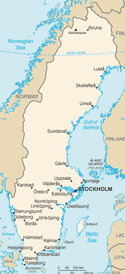Sweden
 Sweden is country of Europe located in north Europe.
Sweden is country of Europe located in north Europe.
Details
| Official Name: | Kingdom of Sweden |
| Capital: | Stockholm |
| Total area: | 449 964 km2 |
| GDP per capita: | $40,393 |
| Native Language: | Swedish |
| Government: | Unitary parliamentary representative democracy |
| Population: | 9,555,893 |
| Major Religion: | Lutheranism, Atheism |
| Monetary Unit: | Swedish krona (SEK) |
Sweden has the largest population of the Nordic countries. It is separated in the west from Norway by a range of mountains and shares the Gulf of Bothnia to the north of the Baltic Sea with Finland.
The southern part of the country is chiefly agricultural, with forests covering an increasing percentage of the land the further north one goes. Population density is also higher in southern Sweden, with many people living in the valley of Lake Mälaren and the Öresund region.
In 1971 the Riksdag became a single-chamber Parliament. Its 349 members are elected on the basis of proportional representation for a four-year term.
The country has at least 17 000 indigenous Samis among its population – a community that derives most of its income from reindeer. Sweden is also home to a small number of ethnic Finns.
Sweden exports cars, engineering products, steel, electronic devices, communications equipment and paper products.
Swedes played a pioneering role of the early days of cinema. Leading the way were Mauritz Stiller and Victor Sjöström. Later on, directors like Ingmar Bergman and actresses such as Greta Garbo, Ingrid Bergman and Anita Ekberg made careers abroad. Swedish music is in many minds synonymous with the '70s pop group ABBA.
Swedish cuisine is known for its Smorgåsbord (a buffet of savoury delicacies), Baltic herring, pea soup and pancakes.
Health & Welfare
Extensive coverage of old-age pension, health insurance, worker's compensation, disability benefits, and un-employment insurance.
Economy & Jobs
Agriculture, forestry, fishing, mining, manufacturing, banking, and foreign trade.
Main Attractions
Stockholm, Gothenburg island, Vadstena town and Visby medieval town.
Economy
Sweden is an export-oriented mixed economy. Timber, hydropower and iron ore constitute the resource base of an economy heavily oriented toward foreign trade. Sweden's engineering sector accounts for 50% of output and exports. Telecommunications, the automotive industry and the pharmaceutical industries are also of great importance. Agriculture accounts for 2% of GDP and employment. The country ranks among the highest in telephone and Internet access penetration. In 2010, Sweden had the third lowest income Gini coefficient among developed countries, at 0.25, slightly higher than Japan and Denmark, suggesting Sweden had low income inequality. However, Sweden's wealth Gini coefficient at 0.853 was the second highest in developed countries, and above European and North American averages, suggesting high wealth inequality. Even on disposable income basis, the geographical distribution of Gini coefficient of income inequality varies within different regions and municipalities of Sweden. Danderyd, outside Stockholm, has Sweden's highest Gini coefficient of income inequality at 0.55, while Hofors near Gävle has the lowest at 0.25. In and around Stockholm and Scania, two of the more densely populated regions of Sweden, the income Gini coefficient is between 0.35 to 0.55.
In terms of structure, the Swedish economy is characterised by a large, knowledge-intensive and export-oriented manufacturing sector, an increasing, but comparatively small, business service sector, and by international standards, a large public service sector. Large organisations both in manufacturing and services dominate the Swedish economy. High and medium-high technology manufacturing accounts for 9.9% of GDP.
Immigration and residency
If you are interested in moving to the countries, either with a residence permit or by acquiring a citizenship, please contact us, and also get acquainted with the relevant migration documents.